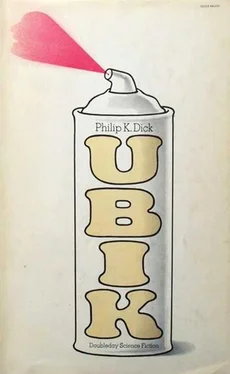Glancing at the coin, Bliss gulped and quavered, “the profile on this coin—this is the deceased! This is Mr. Runciter!” He took another look and blanched. “And the date. 1990.”
“Don’t spend it all in one place,” Joe said.
When the Willys-Knight reached the Simple Shepherd Mortuary the service had already ended. On the wide, white, wooden steps of the two-story frame building a group of people stood, and Joe recognized all of them. There at last they were: Edie Dorn, Tippy Jackson, Jon Ild, Francy Spanish, Tito Apostos, Don Denny, Sammy Mundo, Fred Zafsky and—Pat. My wife, he said to himself, impressed once again by the sight of her, the dramatic dark hair, the intense coloring of her eyes and skin, all the powerful contrasts radiating from her.
“No,” he said aloud as he stepped from the parked car. “She’s not my wife; she wiped that out.” But, he remembered, she kept the ring. The unique wrought-silver and jade wedding ring which she and I picked out… that’s all that remains. But what a shock to see her again. To regain, for an instant, the ghostly shroud of a marriage that has been abolished. That had in fact never existed—except for this ring. And, whenever she felt like it, she could obliterate the ring too.
“Hi, Joe Chip,” she said in her cool, almost mocking voice; her intense eyes fixed on him, appraising him.
“Hello,” he said awkwardly. The others greeted him too, but that did not seem so important; Pat had snared his attention.
“No Al Hammond?” Don Denny asked.
Joe said, “Al’s dead. Wendy Wright is dead.”
“We know about Wendy,” Pat said. Calmly.
“No, we didn’t know,” Don Denny said. “We assumed but we weren’t sure. I wasn’t sure.” To Joe he said, “What happened to them? What killed them?”
“They wore out,” Joe said.
“Why?” Tito Apostos said hoarsely, crowding into the circle of people surrounding Joe.
Pat Conley said, “The last thing you said to us, Joe Chip, back in New York, before you went off with Hammond—”
“I know what I said,” Joe said.
Pat continued, “You said something about years. ‘It had been too long,’ you said. What does that mean? Something about time.”
“Mr. Chip,” Edie Dorn said agitatedly, “since we came here to this place, this town has radically changed. None of us understand it. Do you see what we see?” With her hand she indicated the mortuary building, then the street and the other buildings.
“I’m not sure,” Joe said, “what it is you see.”
“Come on, Chip,” Tito Apostos said with anger. “Don’t mess around; simply tell us, for chrissakes, what this place looks like to you. That vehicle.” He gestured toward the Willys-Knight. “You arrived in that. Tell us what it is; tell us what you arrived in.” They all waited, all of them intently watching Joe.
“Mr. Chip,” Sammy Mundo stammered, “that’s a real old automobile, that’s what it is; right?” He giggled. “How old is it exactly?”
After a pause Joe said, “Sixty-two years old.”
“That would make it 1930,” Tippy Jackson said to Don Denny. “Which is pretty close to what we figured.”
“We figured 1939,” Don Denny said to Joe in a level voice. A moderate, detached, mature, baritone voice. Without undue emotionality. Even under these circumstances.
Joe said, “It’s fairly easy to establish that. I took a look at a newspaper at my conapt back in New York. September 12th. So today is September 13th, 1939. The French think they’ve breached the Siegfried Line.”
“Which, in itself,” Jon Ild said, “is a million laughs.”
“I hoped,” Joe said, “that you as a group were experiencing a later reality. Well, so it goes.”
“If it’s 1939 it’s 1939,” Fred Zafsky said in a squeaky, highpitched voice. “Naturally, we all experience it; what else can we do?” He flapped his long arms energetically, appealing to the others for their agreement.
“Flurk off, Zafsky,” Tito Apostos said with annoyance.
To Pat, Joe Chip said, “What do you say about this?”
She shrugged.
“Don’t shrug,” he said. “Answer.”
“We’ve gone back in time,” Pat said.
“Not really,” Joe said.
“Then what have we done?” Pat said. “Gone forward in time, is that it?”
Joe said, “We haven’t gone anywhere. We’re where we’ve always been. But for some reason—for one of several possible reasons—reality has receded; it’s lost its underlying support and it’s ebbed back to previous forms. Forms it took fifty-three years ago. It may regress further. I’m more interested, at this point, in knowing if Runciter has manifested himself to you.”
“Runciter,” Don Denny said, this time with undue emotionality, “is lying inside this building in his casket, dead as a herring. That’s the only manifestation we’ve had of him, and that’s the only one we’re going to get.”
“Does the word ‘Ubik’ mean anything to you, Mr. Chip?” Francesca Spanish said.
It took him a moment to absorb what she had said. “Jesus Christ,” he said then. “Can’t you distinguish manifestations of—”
“Francy has dreams,” Tippy Jackson said. “She’s always had them. Tell him your Ubik dream, Francy.” To Joe she said, “Francy will now tell you her Ubik dream, as she calls it. She had it last night.”
“I call it that because that’s what it is,” Francesca Spanish said fiercely; she clasped her hands together in a spasm of excited agitation. “Listen, Mr. Chip, it wasn’t like any dream I’ve ever had before. A great hand came down from the sky, like the arm and hand of God. Enormous, the size of a mountain. And I knew at the time how important it was; the hand was closed, made into a rocklike fist, and I knew it contained something of value so great that my life and the lives of everyone else on Earth depended on it. And I waited for the fist to open, and it did open. And I saw what it contained.”
“An aerosol spray can,” Don Denny said dryly.
“On the spray can,” Francesca Spanish continued, “there was one word, great golden letters, glittering; golden fire spelling out UBIK. Nothing else. Just that strange word. And then the hand closed up again around the spray can and the hand and arm disappeared, drawn back up into a sort of gray overcast. Today before the funeral services I looked in a dictionary and I called the public library, but no one knew that word or even what language it is and it isn’t in the dictionary. It isn’t English, the librarian told me. There’s a Latin word very close to it: ubique. It means—”
“Everywhere,” Joe said.
Francesca Spanish nodded. “That’s what it means. But no Ubik, and that’s how it was spelled in the dream.”
“They’re the same word,” Joe said. “Just different spellings.”
“How do you know that?” Pat Conley said archly.
“Runciter appeared to me yesterday,” Joe said. “In a taped TV commercial that he made before his death.” He did not elaborate; it seemed too complex to explain, at least at this particular time.
“You miserable fool,” Pat Conley said to him.
“Why?” he asked.
“Is that your idea of a manifestation of a dead man? You might as well consider letters he wrote before his death ‘manifestations.’ Or interoffice memos that he transcribed over the years. Or even—”
Joe said, “I’m going inside and take a last look at Runciter.” He departed from the group, leaving them standing there, and made his way up the wide board steps and into the dark, cool interior of the mortuary.
Emptiness. He saw no one, only a large chamber with pewlike rows of seats and, at the far end, a casket surrounded by flowers. Off in a small sideroom an old-fashioned reed pump organ and a few wooden folding chairs. The mortuary smelled of dust and flowers, a sweet, stale mixture that repelled him. Think of all the Iowans, he thought, who’ve embraced eternity in this listless room. Varnished floors, handkerchiefs, heavy dark wool suits… everything but pennies placed over the dead eyes. And the organ playing symmetric little hymns.
Читать дальше








